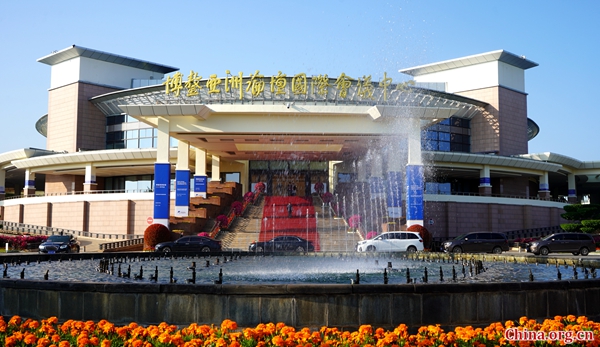
 0 Comment(s)
0 Comment(s) Print
Print E-mail China.org.cn, March 28, 2025
E-mail China.org.cn, March 28, 2025

The Boao Forum for Asia International Conference Center in Boao, Hainan province, March 26, 2025. [Photo by Xu Xiaoxuan/China.org.cn]
Over the past two decades, Global South countries have contributed nearly 80% of world economic growth, solidifying their role as a key driver of global development. Their growing influence has made them a focal point at the 2025 Boao Forum for Asia Annual Conference, held from March 25 to 28 in Boao, south China's Hainan province.
At a panel discussion during the forum on March 26, experts explored the diverse paths to modernization for the Global South, emphasizing collaboration, self-reliance and inclusive development.
Xiaojun Grace Wang, trust fund director at the U.N. Office for South-South Cooperation (UNOSSC), highlighted the varied modernization trajectories of these nations. "Each country has distinct concerns and priorities. Least developed nations and small island states, for instance, have unique considerations," Wang noted. "We must listen to their collective voices, recognize their varying stages of development, and acknowledge that real strength comes from unity amid diversity."
She emphasized that cooperation should extend beyond the traditional North-South divide. "We must leverage the expertise and technology of developed nations," she said, stressing that collaboration in diversity is key.
Kirill Babaev, director of the Institute of China and Contemporary Asia of the Russian Academy of Sciences, underscored the shared aspirations of Global South nations despite their regional differences. "From the Eurasian Economic Union and Shanghai Cooperation Organization to ASEAN and the Gulf Cooperation Council, these nations share common values in globalization, forming the foundation for a broader global economic mainstream," he said.
Zheng Yongnian, dean of the School of Public Policy at the Chinese University of Hong Kong, Shenzhen, identified two major challenges facing the Global South. The first is internal: "These countries often express concerns but struggle to translate them into concrete actions," he observed. The second challenge is external, particularly disruptions to the global trade system initiated by U.S. President Donald Trump's administration. "If globalization is hindered, poverty will deepen, leading to instability," he warned.
Zheng also criticized Western-style modernization for its exclusiveness and lack of inclusiveness. He argued that while Western nations have achieved prosperity, they have not actively helped poorer countries develop. "Economic disparity is detrimental to human rights," he stated.
Citing a Chinese proverb — "in adversity, perfect oneself; in success, perfect all under heaven" — Zheng said that this philosophy is reflected in China's modernization approach. China worked hard to develop when it was poor and now seeks to assist other nations through initiatives like the Belt and Road Initiative and the New Development Bank, he explained.
Danny Quah, dean of the Lee Kuan Yew School of Public Policy at the National University of Singapore, stressed the importance of self-reliance. "Global South countries must demonstrate leadership in their own development," he said.
Quah underlined that economic growth and capacity building are essential for ensuring these nations control their own destinies. True development, he added, involves creating value — building infrastructure, improving public health, and unlocking the creativity and potential of people.
Go to Forum >>0 Comment(s)